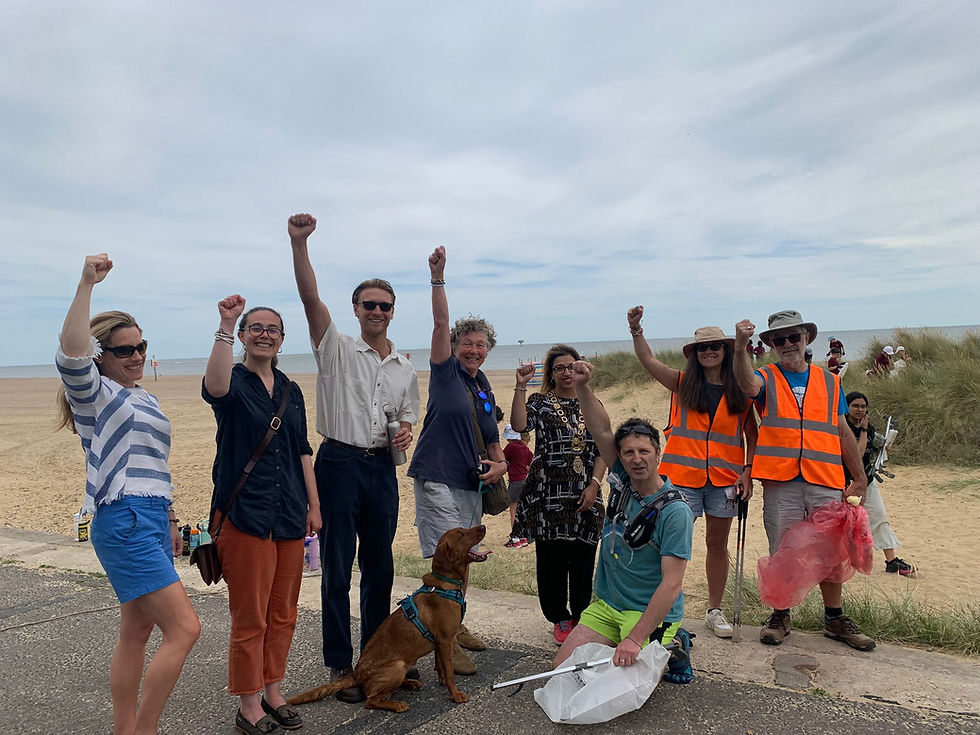How Our Daily Choices Fuel Systemic Transformation
- Nathalia Fisher
- Feb 11, 2025
- 3 min read
Every day, we make countless choices without a second thought—what to drink, what to pack for lunch, and even what we throw away. But what if those everyday habits were the seeds of real, systemic change? In my years running our coastlines and plogging our streets, I’ve learned that it’s not just about cleaning up a beach or picking up a stray can; it’s about challenging the status quo and pushing for a system that works better for everyone by engaging with schools, councils, businesses and communities. ]

The Power of a Single Choice
Consider this: each time you decide to use a reusable water bottle or decline a single-use plastic item, you’re not just saving a little bit of waste for later—you’re sending a clear message. Our economy, our laws, and even our infrastructure are built on and steer habits. When we change those habits, we create pressure for change on a much larger scale.
When you choose to recycle properly or opt for sustainable products, you contribute to a ripple effect that can eventually influence policy and industry standards -IF we harness that. It’s a simple idea with profound implications: if enough of us act consciously, we can force our systems to adapt. And that’s how real, lasting change begins.
From the Shoreline to the System
At The Coastline Runner initiative, our mission isn’t merely to collect litter—it’s to inspire a movement. Every plogging event, every community clean-up, and every conversation with local schools, councils, and businesses serves as a reminder that our daily actions matter. When we all commit to these small changes, we start to build a collective force that pushes for smarter policies and better infrastructure.
Take our plogging runs, for instance. Each run isn’t just a physical act—it’s a statement. It shows that we refuse to accept our environment as a dumping ground for plastic waste. Instead, we are actively challenging the unsustainable habits that have brought us to this point. We’re saying, “We can and we will do better.”

Building the Foundation for Systemic Change
Systemic change isn’t something that happens overnight. It’s built on thousands of small decisions made every day. Here’s how our individual actions can lay the groundwork for broader change:
Economic Shifts: When consumer demand shifts toward eco-friendly products, companies and industries must adapt. Every time you choose a reusable item over a disposable one, you’re part of a market force that pushes businesses to innovate and reduce waste.
Policy and Legislation: Collective action—like the impact of countless people joining in a beach clean-up—can influence public opinion and, in turn, policy decisions. When local communities demonstrate a strong commitment to environmental action, governments are more likely to enact laws that support sustainability.
Infrastructure Improvement: Our habits also drive infrastructure investments. Increased recycling rates and reduced waste encourage cities to improve their waste management systems, making recycling easier and more efficient for everyone.

A Call to Action
So, I ask you: What everyday habit can you change that will contribute to a bigger movement? Is it as simple as saying no to single-use plastics, or choosing to recycle more responsibly? Perhaps it’s even more personal—like choosing to educate yourself and others about the true cost of our consumption habits.
I challenge you to look at your daily routine and find one small change you can make. Because when thousands of us make that change, it becomes the force that reshapes our society—from economic models to environmental policies.
Join me in this movement. Let’s harness the power of our daily choices to create the systemic change we desperately need. Share your thoughts and experiences in the comments below—together, we can turn small habits into a tidal wave of change.



Comments